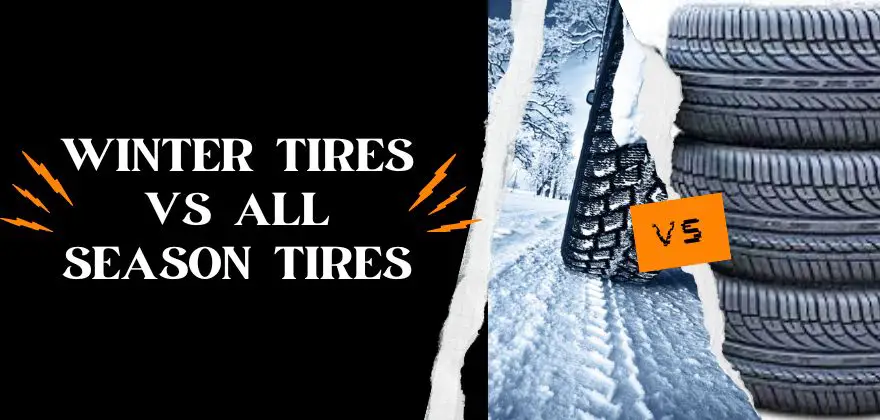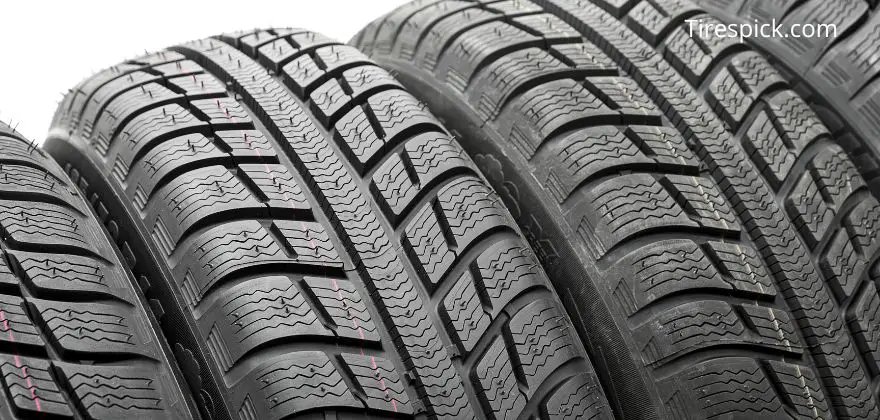Winter tires are designed to provide maximum traction and safety on snowy and icy roads, whereas all-season tires are a compromise between handling in various weather conditions. Winter tires have a softer rubber compound and deeper treads, which allows them to maintain grip in extremely low temperatures. All-season tires may be adequate for moderate winter conditions, but for extreme weather, winter tires are the better choice for safety and performance.

Purchasing a tire can be quite tricky because we do consider certain aspects important eg: speed ratings, temperature recommendations, appropriate sizes, etc. In this article, it will be explained by comparing the features between Winter tires & All season tires, the differences between both do possess and conclude with a discussion on which is the better tire that can be purchased.
The comparison chart on winter tires vs all-season tires
| Features | Winter tires | All season tires |
| Recognition | Represents a mountainous symbol | Includes M + S |
| Material | It is less durable but flexible in colder temperatures | Higher level of durability which hardens in colder temperatures |
| Performance during rainy conditions | High | Low |
| Performance during colder conditions | High | Low |
| Cost implications | High | Low |
| Wear and tear | High | Low |
| Tire sizes | Similar | Similar |
| Fuel consumption | High | Low |
Factors to consider while deciding to purchase the perfect tire?
It is a responsibility when purchasing a new set of tires. There is certainly not a level of frequency that we look into when purchasing a new set of tires. Usually, there are new developments that take place in tire technologies.

When deciding the moment you should purchase a new set of tires, a simple visual inspection will help the individual to decide whether the tires have exhausted their useful life of the tires. Also, it is possible to check on the trouble signs for an uneven tire which will help to identify whether the tire should be replaced. Moreover, the following factors can be considered while choosing the appropriate tire for the vehicle:
Size
It is highly important to consider the vehicle manufacturer’s specifications before approaching the tire dealer to purchase a proper size. The tire dealer’s also would help to verify the tire size by comparing it with the make and model.
The lifespan of the tire
The tire life expectancies vary & a major factor that can be considered is the number of miles that the vehicle has traveled. The tires that do possess in giving a shorter lifespan are mainly manufactured for a superior level of performance & smooth ride.
Weather conditions
Tires are usually manufactured keeping in mind the optimal level of performance that are suitable in different types of conditions. In some areas, there is a higher tendency for a colder climate which leads to snowfalls. Hence, while purchasing it is important to note whether will it be used all year or during the individual seasons.
Noise
Tires do tend to produce noise, where some do generate comparatively more than others. Especially the tread designs are one of the important reasons to cause noises while traveling so some do feel the effect of disturbance so it is important to go for test drives before purchasing.
How do you describe an all-season tire?
All-season tires are a form of compromising which allows them to adequately perform in all types of conditions without necessarily overperforming on a particular condition or type of weather. An article that states the majority of the cars used in the U.S are initiated with all-season tires in the factory.

It is designed in a way that can allow it to be used for both colder & dryer weather conditions. The tread blocks are medium-sized with more edges when compared to summer tires. Some threads do allow to provide extra grip but during cold weather conditions, they would harden by reducing the traction. All-season tires do not wear off easily & can be used for a longer period when compared to winter tires because the rubber compound used in winter tires is quite soft so it wears down more quickly.
In terms of cost, all-season tires are cheaper because the sum of purchasing the tire & installation do come together but the winter tires have to be purchased separately, as well as there is a separate installation cost that needs to be incurred. Hence it is comparatively cheaper to purchase all-season tires as opposed to winter tires.
Are all-season tires worth it to buy?
Many of the vehicles are mostly fitted with all-season tires. Because all-season tires do help to provide a quiet ride, a strong span of life in which the tread can be used & an all-year-round performance that certainly makes it popular.
Moreover, all-season tires do help to provide a versatile level of performance which further enables them to perform in different types of conditions whether it’s wet or on roads in winter conditions. It also provides a combination of benefits while traveling on summer and winter condition roads.
Do all-season tires count as snow tires?
They do not necessarily count as snow tires but they can be used in winter conditions by keeping in mind the limitations of the extent they can be performed in those conditions. Because snow tires are specifically made for those conditions but all-season tires are flexible to adapt.
How much does an all-season tire cost?
Based on an external source, the all-season tires cost between $60 to $110 plus tax for each tire inclusive of the installation costs.
How long all-season tires can be used?
The approximate timeline that all-season tires can be used is for three years but it might vary with the number of miles you travel which will decrease the lifespan of the tire that can be used.
Are all-season tires good during rainy conditions?
Most apparently yes, it is possible to use all-season tires in rainy conditions & it provides a good level of traction while traveling.
Do all-season tires benefit during the winter season?
All-season tires have the quality of providing tires that are usable all year round especially the drivers who live in a moderate climate and do not usually face extreme cold conditions. It provides good performance in a variety of driving conditions but it also has to compromise its capabilities while aligning to extreme summer or winter conditions.
However, it will provide a good amount of traction & handling, lower level of noise, be less costly, it takes longer to wear out so these are some of the factors how all-season tires would help out during the winter season
But having said that, all-season tires will be affected during extreme weather conditions that would affect the overall traveling. So it is important from a driver’s point of view to assess the weather conditions & the temperature before foregoing the purchase.
Please refer to the below Youtube link to understand more about how all-season tires benefit during the winter season or in different types of seasons:
How do you describe winter tires?
When we consider driving during winter conditions, it is important to have the right tire because when there are a heavy amount of snowfalls, the roads become quite unpredictable & which makes the tires to be challenged especially in receiving traction.

Winter tires are specifically designed to perform in colder conditions to smoothly travel & not put pressure on the vehicle. Snow/ Winter tires tend to use rubber components that allow gaining extra traction, especially in low temperatures that also has tread designed to smoothly flow through the snow. Winter tires are ideal in extremely colder conditions.
Furthermore, the winter tires possess traction with deeper grooves & sharp edges. Because the rubber compounds are quite flexible to provide smooth traveling, especially in the lower level temperatures & enhanced level of traction on icy roads.
How do winter tires handle ice?
Winter tires do handle ice quite smoothly because the tread has deep, jagged offers better traction in colder conditions. Moreover, as mentioned before the rubber compounds helps it to stay soft and flexible during icy weather to help with the grip.
The winter tires certainly have more siping to maximize the level of grip, especially in winter driving conditions. Having control of your vehicle is very important, especially on tracks that are icy or snowy which includes for you to stop the vehicle even at higher speeds. For example, when you’re having tires that are not suitable for wet or cold conditions then there are higher chances of the vehicle skidding or loose out of control but when using winter tires that helps you to have control of the vehicle.
Is it worth purchasing winter tires?
This depends on the driver who needs to consider their traveling schedule. Because installing winter tires, especially for a short period of around 5 to 6 months can be a good idea or not. Especially if the driver is traveling to mountainous locations very often because usually, it is safer to have winter on those types of roads.
But it is costly when compared to all-season tires, lesser timespan it can be used & higher weariness so overall it depends on the driver if they need to purchase a winter tire to have a safe journey in colder conditions.
How many miles do winter tires last?
As per a source, which states that it is possible to use winter tires by driving around 13,500 miles per year & it also varies because some do prefer to use it during the winter conditions as opposed to all year round so that will create deviations.
Do winter tires use more gas?
Winter weather creates difficult driving circumstances where you’ll tend to encounter rougher types of roads. Moreover, there is a tendency that your engine needs to work harder to overcome the increased resistance the obstacles create.
How much do winter tires cost?
Based on an article that states, winter tires do cost between $100 to $200 with an additional cost of $75 for installation which makes it slightly expensive but it is made specifically for colder conditions.
Do you require all 4 winter tires?
Yes. Because only then it will be possible for the vehicle to move smoothly & not lead to oversteering or stalling
How do Winter tires perform during extremely cold conditions?
During winter conditions or snowy weather, the winter tires do possess a significant advantage. Because winter tires can get from 0 to 60mph in around 19 seconds while on snow but all-season tires do it in around 22 seconds.
Usually, it is kinda difficult to stop or halt in extremely cold conditions because there is a higher tendency that the vehicle may skid or slip, but the winter tires certainly help the tires to stop while going at a speed of around 55mph at 380 feet but all-season tires take longer.
There is a recent survey that states that vehicles use winter tires are around 35% less likely to be involved in a collision when compared to all-season tires. Hence, it provides more protection & there is an extra level of grip is maintained.
Please access the below link to find more details on how winter tires perform during cold conditions:
Is it possible to use Winter tires all year & does it wear out faster compared to All season tires?
Yes, it is possible to use winter tires all year but there are a few limitations that need to be considered such as:
- The rubber compound on winter tires will not help to deliver a good amount of handling in other seasons.
- Some of the elements in terms of braking and acceleration would be compromised in hot weather.
In terms of traction, lack of tread could be a bigger safety risk. - There will be larger implications on wear & tear.
Winter tires do wear out faster especially if it is being used all year because, during a summer season where it is quite hot & a softer rubber compound that directly reacts to the heat as well as pavement so comparatively to all-season tires, it wears out faster.
Which tire is less costly?
All-season tires are less costly and can be purchased for between $60 to $110 plus tax inclusive of installation so which is comparatively less than winter tires.
All-season tires vs Winter season tires – which is the best?

All-season tires are designed in such a manner that allows the drivers to experience a smooth & quiet ride in most conditions. Moreover, they can be used all year round, especially through rainy or colder conditions & they also help to provide a mild amount of traction in a lighter level of snow but are not specifically designed for deep snow or cold weather conditions.
The winter tires are specifically designed for extremely colder conditions eg: snow, ice, etc… The rubber compounds on those tires tend to stay soft & provide flexibility in colder conditions. Since this helps to improve traction, a higher level of control when temperatures are quite low so even during the harshest of conditions, the winter tires help to overcome the circumstances.
However, to decide which is the best between All season & winter tires will be explained after going through the advantages as well as disadvantages that each possesses:
All-season tires
| Pros | Cons |
|---|---|
| Less costly | A lower level of control in extremely cold conditions |
| Low level of wear & tear | A lower level of performance in cold conditions |
| Suitable to use in all seasons | |
| Longer lifespan | |
| Provides a good level of performance |
Winter season tires
| Pros | Cons |
|---|---|
| Provides a higher level of traction in colder conditions | Expensive |
| Higher level of control in winter conditions | Higher level of wear |
| Specifically designed for colder conditions | The lower lifespan if used in all conditions |
| Higher level of fuel consumption |
By assessing the above factors & understanding the advantages as well as the disadvantages, it can be noticed that all-season tires are the best to use if the intention of purchase is seen through cost or lifespan but if it is being used for a specific purpose such as Winter season then it is possible to proceed with winter tires so it depends with the intention of the purchase.
Frequently asked Q&A while buying tires
What should I consider before buying new tires?
Size
Lifespan
Suitable for different weather conditions
What causes winter season tires to wear down?
It usually wears down if it is being used in all weather conditions because the rubber compound is soft & not align with hotter conditions.
When will I need to replace my tires?
– Some tires do have the flexibility to be used for a longer timespan eg: All season tires can be used for three years.
– Winter-season tires can be used for 6 seasons if they are used specifically for winter time period.
Where should I buy my tires?
Please conduct research on finding genuine locations from trusted manufacturers who will provide quality tires.
Is it important to consider the size of my tire & the vehicle before purchasing?
Yes
Public reviews on which tire is the perfect
There are multiple brands on whether it is All season tires or winter season tires but if I had to consider only the reviews that were received from one of the brands:
- All-season tires – 667 reviews
- Winter season tires – 185 reviews
Hence, in terms of popularity, most of the consumers are using all-season tires as opposed to winter season tires & as discussed previously that all-season tires provide more benefits than winter season tires.

AR Jeet has been a tire mechanic for over 2years. He has worked on all types of vehicles, from cars and trucks to RVs and ATVs and motorcycles. He has seen it all when it comes to tires, and he knows how to fix them.
AR Jeet is a tire expert, and he is passionate about his work. He loves to help people keep their vehicles running smoothly, and he is always happy to answer any questions that people have about their tires.
If you need help with your tires, or if you just want to learn more about them, then AR Jeet is the man to talk to. He will be happy to help you out, and he will make sure that you get the best possible solution.
He has a blog [Tirespick.com] where he writes about all things tire-related, and he is always happy to help people with their tire needs. Know more about AR Jeet.
